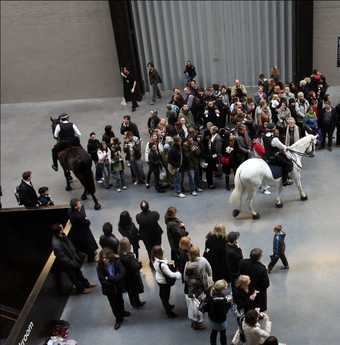
Tania Bruguera
Tatlin’s Whisper #5
(2008)
Tate
Tate is governed by a Board of Trustees in accordance with the Museums and Galleries Act 1992.
The Board delegates the day-to-day running of Tate to the Director, who has responsibility under the Board for the overall organisation, management and staffing of Tate. The Director, currently Maria Balshaw, is appointed by the Board with the approval of the Prime Minister. She is Tate’s Accounting Officer and is responsible to the Board for the general exercise of the Board’s functions. The Director is assisted by Executive Group in setting strategic direction for Tate.
Aims and objectives
Our mission is to increase the public’s enjoyment and understanding of British art from the sixteenth century to the present day and of international modern and contemporary art.
Its statutory aims and objectives set out in its governing document are:
- to care for, preserve and add to the works of art and the documents in its collections;
- to ensure that the works of art are exhibited to the public;
- to ensure that the works of art and the documents are available to persons seeking to inspect them in connection with study or research; and
- generally to promote the public’s enjoyment and understanding of British art, and of twentieth-century and contemporary art, both by means of the Board’s collections and by such other means as they consider appropriate
Find out more about our priorities and how we are fulling our mission to increase public understanding and enjoyment of art.
Legal and Charitable Status
Tate is an executive non-departmental public body sponsored by the Department for Digital, Culture, Media and Sport (DCMS) and an exempt charity defined by Schedule 3 to the Charities Act 2011. It is exempt from registration with, and oversight by, the Charity Commission and is regulated by DCMS in accordance with a management agreement agreed by the Secretary of State for Digital, Culture, Media and Sport for charity law purposes.
Tate has full charitable status in the UK. Raising funds through sponsorship, donations and legacies support Tate to fulfil its mission deliver a wider range of educational and artistic programmes across the UK. Neither Inheritance Tax nor Capital Gains Tax are charged on gifts to Tate. Tate is able to receive Gift Aid in relation to any gifts or donations offered.
Connected charities
Tate has three connected charities. These are independent and do not impact on Tate’s operating policies. They work closely with Tate and have the aim of helping Tate fulfil its mission for the public benefit.
- Tate Foundation (registered Charity number 1085314)
Tate Foundation was established in the 1980s and re-launched in 2006 as an advisory board and membership body. Its primary aim is to support Tate’s growing need to fund acquisitions, exhibitions, learning, research, conservation and capital projects. Tate Foundation’s Chairman is Roland Rudd.
- Tate Americas Foundation
- Tate Canada Foundation
Tate Members
Tate Members was established in 1958 as Friends of the Tate Gallery to support the fulfilment of Tate’s charitable aims and objectives.
At an Extraordinary General Meeting of 26 February 2016, it was decided that the charity would be merged with Tate. The process was enacted in 2016–17.
Detailed financial statements for Tate Members are available on the Charity Commission website.
Subsidiaries
The following are wholly owned subsidiaries of the Board through which Tate operates its highly successful trading activities: publishing, catering and retail. All profits go to support the work of Tate.
Tate Exhibition Productions Limited
Tate Enterprises Limited
Tate Enterprises
Tate Enterprises is a wholly owned subsidiary of Tate through which we operate our highly successful trading activities: publishing, catering and retail. Profits go to support the work of Tate.
Tate Enterprises:
- Manages and operates restaurant, café and ancillary services at Tate for the benefit of visitors to Tate’s galleries
- Publishes and sells books and merchandise associated with the collection and Tate activities
Tate Enterprises is a direct subsidiary of the Board of Trustees and comprises three divisions: Tate Commerce, Tate Eats and Tate Business. Each division is run by a Chief Executive who reports to the Board of Directors of Tate Enterprises, which comprises 10 people (including two Trustees, three external advisors, three Directors of Tate and the two CEOs of Tate Enterprises).
Funding
Government funding is received from the Department of Digital, Culture, Media and Sport (DCMS) and the requirements are laid out in Tate’s management agreement with the department.
Tate is accountable to the public via Parliament for the services it provides. As such, it is required to demonstrate that it is conducting its operations as economically and effectively as possible.
Tate supplements the grant it receives from the DCMS through other sources, including trading, admissions to temporary exhibitions and fundraising activities. Around 70% of our income is raised from non-government sources.
Financial statements
Tate publishes annual audited financial reports. Currently the internal auditors are RSM, and Tate’s external auditor is the National Audit Office with Moore Kingston Smith as the subsidiary company auditors.
The accounts have been prepared in accordance with the Statement of Recommended Practice (the SORP) FRS102 (updated for reporting from 2019) and in compliance with the Accounts Direction issued by the Secretary of State for Digital, Culture, Media and Sport.
Find out more about Membership of the Sub-Committees of the Board of Trustees who have delegated decision-making authority.
